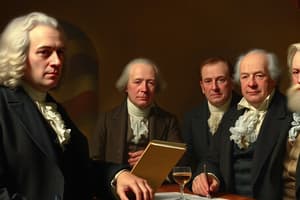Podcast
Questions and Answers
Which economic system did the Democratic-Republicans favor?
Which economic system did the Democratic-Republicans favor?
- A national economy based on manufacturing and trade
- An economical system based on agriculture (correct)
- A robust system centered around international commerce
- A mixed economy incorporating both agriculture and manufacturing
What was a key characteristic of the Federalists' foreign policy?
What was a key characteristic of the Federalists' foreign policy?
- Neutral towards both France and Britain
- Pro-French and anti-neutrality in foreign conflicts
- Anti-British and pro-alliance with Spain
- Pro-British and pro-neutrality in foreign conflicts (correct)
What interpretation of the Constitution did the Federalists support?
What interpretation of the Constitution did the Federalists support?
- An interpretive flexibility that changed with prevailing political trends
- An ambiguous interpretation that favored state rights
- A loose interpretation that allowed for greater federal influence (correct)
- A strict interpretation that limited federal powers
Who were the leaders of the Democratic-Republicans?
Who were the leaders of the Democratic-Republicans?
Which stance did the Democratic-Republicans take regarding banking?
Which stance did the Democratic-Republicans take regarding banking?
Flashcards
What is the Federalist Party?
What is the Federalist Party?
The first political party in the United States, led by Alexander Hamilton and John Adams, who favored a strong federal government, a national economy based on manufacturing, shipping, and trade, and a loose interpretation of the Constitution.
What is the Democratic Republican Party?
What is the Democratic Republican Party?
The second political party in the United States, led by Thomas Jefferson and James Madison, who favored a smaller federal government, an economy based on agriculture, a strict interpretation of the Constitution, and neutrality in foreign conflicts.
What is a loose interpretation of the Constitution?
What is a loose interpretation of the Constitution?
They favored a broad understanding of the Constitution, allowing the government to take on powers not explicitly stated in the document. This approach emphasizes flexibility and adaptability.
What is a strict interpretation of the Constitution?
What is a strict interpretation of the Constitution?
Signup and view all the flashcards
What is the Federalist view on the strength of the federal government?
What is the Federalist view on the strength of the federal government?
Signup and view all the flashcards
Study Notes
John Adams Presidency (1797-1801)
- John Adams became the second President of the United States, succeeding George Washington.
- Political divisions deepened during Washington's presidency.
- Further divisions arose under Adams, despite Washington's warnings.
- This led to the emergence of two major political parties: Federalists and Democratic-Republicans.
Federalists
- Led by Alexander Hamilton and John Adams.
- Supported a strong central government.
- Favored a wealthy, educated elite.
- Advocated for order and unity.
- Supported a strong national economy based on manufacturing, shipping, and trade.
- Favored a loose interpretation of the Constitution.
- Generally favored close ties with Great Britain.
Democratic-Republicans
- Led by Thomas Jefferson and James Madison.
- Believed in a smaller, more decentralized government.
- Believed people should have political power.
- Advocated for individual rights.
- Supported a strong agricultural economy.
- Favored a strict interpretation of the Constitution.
- Favored close ties with France.
Studying That Suits You
Use AI to generate personalized quizzes and flashcards to suit your learning preferences.




